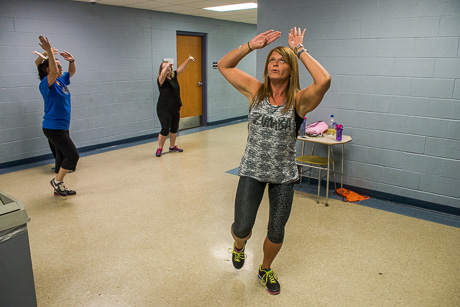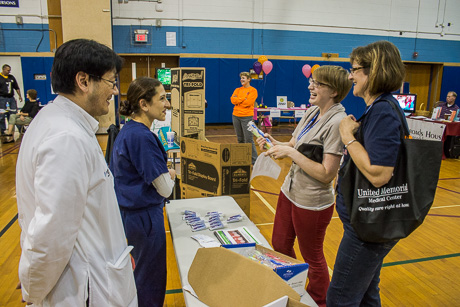Batavia teachers, administrators dealing with gamut of emotions as first day of school nears
As would be expected, anxiety at both the instructional and administrative levels is evident as the Batavia City School District prepares to welcome back students.
“We’re feeling all of the feelings at once,” said Mark Warren, president of the Batavia Teachers’ Association, on Wednesday. “Everybody is excited to be back and wants to see their kids, their students. They want to get back to working with students. For a lot of people, though, there’s some fear mixed in – in terms of being around groups of people.”
The first day for classes – some in-person and some remotely thanks to COVID-19 – is next Monday. Teachers returned on Tuesday for the first of four days of professional development.
Warren said most teachers are “overpreparers” who are feeling less than confident considering the changed landscape and prevailing stipulations.
“There are many people who really want to be overprepared, and that is very challenging in this brand-new environment,” he explained. “There are teachers who feel underprepared, not in a negative way, but these are people who are overplanners and overpreparers. This is a new experience for them and they can’t do what they normally do.”
When told about the current mood of district teachers, Superintendent Anibal Soler Jr. said he is apprehensive as well.
“I’m anxious, too, and nervous, and worried and making sure everything is going to work out the way we planned it,” he said. “But I’m also optimistic that we’ve done our part. We won’t know until we try.”
Warren, choosing his words carefully, acknowledged the challenges involved with embarking upon a foreign system and, with 250 instructors in the district, the varied opinions on reopening.
“In the two days that we’ve been back, there has been a fair amount of professional development – teaching us how to be good remote or hybrid teachers,” Warren said. “There’s still some of that left to go. But one of the bigger challenges that we have right now is actually implementing a lot of those things.”
He said teachers “need some more time … it’s going to be a process,” but emphasized that the union has not asked administration to push back opening day.
“Every teacher here went to school to learn to teach in an in-person environment. All of these things that we’ve done over our entire careers are completely changed in the virtual or remote environment,” he offered. “Some of the things that may be super effective in the classroom just won’t work in a remote setting – especially since we’ll be seeing the students for about 40 percent (of the time) that we’ve seen them in previous years.”
Warren mentioned that lessons plans requiring sharing of materials or working in small groups “can’t happen in a remote environment, so we have to adapt all of lessons that we’ve done into ones that will work in a remote environment, and that’s going to take time.”
Soler said he understands the emotional strain involved in reopening under these conditions.
“No one has ever opened a school under these requirements or guidelines,” he said “There are some concerns that things could go wrong, but we’re trying to be cautiously optimistic and be strong about it. We’re trying to use common sense … to get the operational stuff going and making sure the kids and staff enter the building safely.”
Considering the daily protocol required just to enter the school building, it isn’t hard to realize that employees would be on edge.
“Every morning when they come in they have to fill out a daily attestation (an official confirmation) that says that they feel good and they don’t have a temperature – any of those things that they’re coming to work on – before we take their temperature at the door,” Soler said. “It’s a brand-new process and if you think about it, it is a bit scary.”
The attestation seeks the answers to several questions, he said.
“Did you check your temperature? You don’t have a fever over 100 degrees. You feel well. You don’t have any symptoms like shortness of breath or fatigue, body aches, fever, chills, sore throat or any loss of taste or smell,” he said. “You haven’t been exposed to anybody with COVID – typical Department of Health protocol questions.”
If the answer is yes to any of those questions, the teacher can come to work and have his or her temperature taken again, Soler said, adding that face coverings must be worn at all times.
Soler said those feeling ill during the day will have to contact their doctor and receive a negative COVID-19 test – “another layer of complications that we can’t control.”
The superintendent said he thinks attitudes will improve with time.
“We’re in day two with the staff and believe that every day that they’re here, the comfort level will get better and better,” he said.
He also stressed that district parents want their children back in school.
“We’re all fearful; we all want this to work. We want our kids back and we want the socialization, the normalcy of that, which will help our families. This community wants to be back in person as much as possible,” he said.
As far as staffing is concerned, Soler said that only a “handful” of teachers have asked for child care leave and one teacher with 38 years of experience decided to retire.
Warren is asking for his members to trust the process.
“There are teachers who are anxious about coming back for health and safety purposes, and there are teachers who are anxious about coming back because we’re doing something we’ve never done before – in terms of remote learning,” he said. “But, just seeing our colleagues this week has been great and seeing our students next week will be great.”


